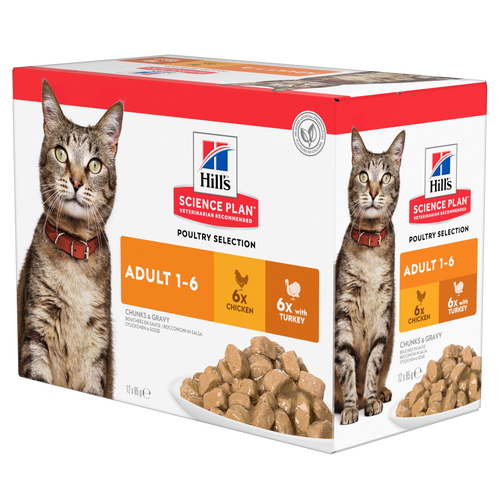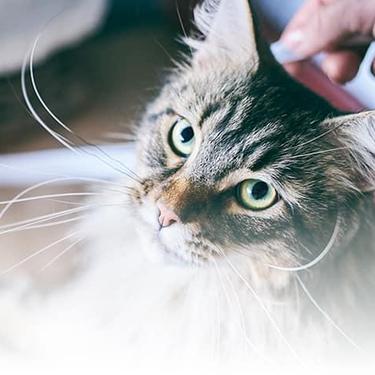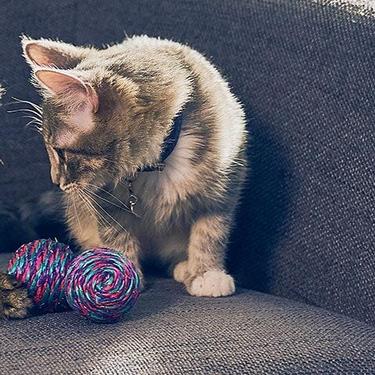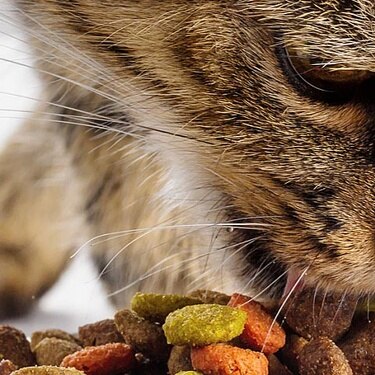
-
Find the right food for your petTake this quiz to see which food may be the best for your furry friend.Find the right food for your petTake this quiz to see which food may be the best for your furry friend.Featured products
 Adult Wet Dog Food with Beef
Adult Wet Dog Food with BeefHill's Science Plan Adult Multipack Wet Dog Food with Chicken, Beef & Turkey are complete premium pet foods for adult dogs from 1 year. Your dog will love these deliciously smooth and savoury minced loaves, formulated for balanced nutrition and overall health.
Shop Now Puppy Food
Puppy FoodHill's Science Plan Puppy Multipack Wet Dog Food with Chicken & Beef are complete premium pet foods for growing puppies from weaning until 1 year old and for pregnant and nursing dogs. Your puppy will love these deliciously smooth and savoury minced loaves, formulated for balanced nutrition and overall health.
Shop Now Mature Adult Dog Food
Mature Adult Dog FoodHill's Science Plan Mature Adult Multipack Wet Dog Food with Chicken & Beef are complete premium pet foods for mature adult dogs from 7 years. Your dog will love these deliciously smooth and savoury minced loaves, formulated to deliver the appropriate amount of energy to support the needs of adult dogs.
Shop NowFeatured products Mature Adult Wet Cat Food with Chicken
Mature Adult Wet Cat Food with Chicken
Tender chicken chunks in gravy for mature adult cats. Made with easy-to-digest ingredients, high-quality protein for lean muscle maintenance and antioxidant vitamins C+E for optimal health.
Shop Now Adult Multipack Wet Cat Food with Beef, Ocean Fish & Chicken
Adult Multipack Wet Cat Food with Beef, Ocean Fish & ChickenTender chunks in gravy for cats, with high-quality protein to maintain lean muscle. With vitamin E and omega-3s & -6s for healthy skin and balanced minerals to support healthy vital organs.
Shop Now Light Adult Multipack Wet Cat Food with Chicken & Ocean Fish
Light Adult Multipack Wet Cat Food with Chicken & Ocean FishTender chicken chunks in gravy for cats, with L-carnitine and fewer calories for ideal weight management. Packed with high-quality protein, omega-6s, and vitamin E for shiny fur and healthy skin.
Shop Now -
Dog
- Dog Tips & Articles
-
Health Category
- Weight
- Food & Environmental Sensitivities
- Urinary
- Digestive
- Joint
- Kidney
-
Life Stage
- Puppy Nutrition
- Adult Nutrition
- Senior Nutrition
Cat- Cat Tips & Articles
-
Health Category
- Weight
- Skin & Food Sensitivities
- Urinary
- Digestive
- Kidney
-
Life Stage
- Kitten Nutrition
- Adult Nutrition
Featured articles The Incredible Science Behind Your Pet's Microbiome
The Incredible Science Behind Your Pet's MicrobiomeLearn what your pet's microbiome is, how it contributes to your pet's gut and overall health, and why nutrition is important in maintaining healthy microbiomes.
Read More The Right Diet For Your Pet
The Right Diet For Your PetIn people, the right diet is very important. If you are eating the wrong way for your metabolism, activity level, age and lifestyle you could end up with health issues.
Read More Show some love with wet foods: a great choice for pets with health issues
Show some love with wet foods: a great choice for pets with health issuesShow some love with wet foods: a great choice for pets with health issues.
Read More -


For the best start in life, physically and mentally, kittens should stay with their mums until at least nine weeks of age. Normally, by the time you take your kitten home, they should already be fully weaned and eating solid food, whether that’s wet, dry, or ideally a combination of the two. However, if the mum and litter are yours, or the kittens have been orphaned, you may need to wean the kittens yourself. You can start to do this at around three to four weeks of age.
Working with mum and Mother Nature
If the kittens’ mum is on the scene, the weaning process usually starts quite naturally as the kittens start to move around more and explore their surroundings. They will, quite literally, stumble across mum’s food and start to explore the taste and feel of it. Ideally, the mother should already be eating kitten food because this is the best way to make sure she has the calories and nutrients she needs for lactation. Speak to your vet as early in her pregnancy as possible to find out about worming, nutrition, and when and how to switch mum from adult food to kitten food.
Mum may not be too keen on the kittens stealing her food and may even try to deter them herself. At three to four weeks of age, or when you see this process start, whichever is sooner, you can start to offer the kittens some kitten food of their own. You can add extra into the enclosure on shallow plates or saucers for easy access, or make a little area separate from the mum to give her a break too.
It’s very important that you give a complete and balanced kitten food (which would ideally be the same as the mother’s). You can feed wet, dry, or a combination of the two, but to start with, any kibble you are feeding should be moistened with a little warm water prior to feeding so it’s soft for the kittens’ young mouths.
Weaning needs to be a gradual process to avoid overwhelming the kittens’ gastrointestinal systems, so start by offering just a tiny amount several times a day. You can either put it on a saucer or offer it on your finger tip. Young kittens will always paddle around in food to start with because they won’t really know what it is. This is quite normal and will help them learn, so be patient and clean the plates often, and the kittens if you need to!
As the days go by, you can slowly increase the amount of solid food you give and gradually decrease the water added to the kibble until it is being offered dry. Once the kittens have got used to food, they should start favouring it and will become very enthusiastic eaters, using mum more for a top-up and for the comfort of suckling. When you’re happy the food is accepted and there are no tummy upsets, you can feed the kittens ad lib if you want to. This will mean they can eat multiple times a day, as and when they want to. If you can’t do this, they should be having, at the very least, four meals a day but ideally more.


Tasty Tips
Mum, just like us humans, will start to tell the kittens when she’s had enough of feeding them and her milk will start to dry up. Most kittens should be fully weaned onto solid food by six to eight weeks of age, and ready to go to their new homes from nine weeks.
How do you know if everything is OK?
Your kittens should be weighed every few days to start with. Your vet should be able to supply you with growth charts so that you can see if they are growing as expected. When well-nourished and content, kittens will sleep a lot of the time and have full, round bellies. If they are crying a lot, not sleeping, or looking thin, then something is wrong and a trip to the vet is in order.
If the kittens have been orphaned or there is a problem with the milk supply, ask your vet for an appropriate substitute milk formula and advice on how to give it. Do not give kittens cow’s milk; it isn’t nutritionally adequate for kittens and they won’t be able to digest it.
If you’re hand-rearing the kittens, follow the same weaning advice and gradually reduce the amount of kitten milk you’re offering between four and eight weeks of age as the solid food increases.
And finally…
Kittens should stay on kitten food until they are adults, usually between nine and twelve months of age. Kitten food is formulated to be calorie- and nutrient-dense in order to support their incredible growth. After neutering, some young cats may start to gain too much weight on kitten food and will benefit from a food formulated for exactly this scenario. Speak to your vet about when and how to switch them away from kitten food. Most importantly though, don’t forget to take time to fully enjoy watching the little rascals bloom into even naughtier, entertaining teenagers!
Reviewed by Dr. Hein Meyer, DVM, PhD, Dipl-ECVIM-CA


One of our staff authors prepared this article for you
Related products


Tender chicken chunks in gravy for mature adult cats. Made with easy-to-digest ingredients, high-quality protein for lean muscle maintenance and antioxidant vitamins C+E for optimal health.

Tender chunks in gravy for cats, with high-quality protein to maintain lean muscle. With vitamin E and omega-3s & -6s for healthy skin and balanced minerals to support healthy vital organs.

Tender chicken chunks in gravy for cats, with L-carnitine and fewer calories for ideal weight management. Packed with high-quality protein, omega-6s, and vitamin E for shiny fur and healthy skin.
Related articles

Learn how to make homemade cat treats that are healthy for your pet with this recipe from Hills Pet Nutrition.

There are three common ways to feed a cat. Each way has its advantages and disadvantages.

Kittens grow a lot in their first year, so it is important to provide them with the proper nutrients early, so they grow up healthy and strong. Learn more.

From essential vitamins & minerals to different types of meat, learn what to look for when choosing the best cat food for your feline.

Put your cat on a diet without them knowing
Our low calorie formula helps you control your cat's weight. It's packed with high-quality protein for building lean muscles, and made with purposeful ingredients for a flavourful, nutritious meal. Clinically proven antioxidants, Vitamin C+E, help promote a healthy immune system.
Put your cat on a diet without them knowing
Our low calorie formula helps you control your cat's weight. It's packed with high-quality protein for building lean muscles, and made with purposeful ingredients for a flavourful, nutritious meal. Clinically proven antioxidants, Vitamin C+E, help promote a healthy immune system.

